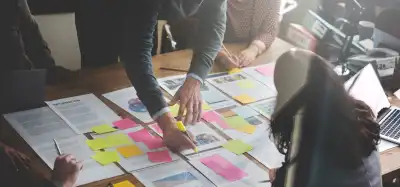Summary
City College of New York President Vincent Boudreau initially utilized OKRs to raise the school and his staff’s profiles, increase donations, and address structural issues. When COVID-19 forced in-person classes to immediately shut down, Boudreau used OKRs to guide the transition of over 50,000 courses to online learning.
College campuses were one of the first institutions affected by the COVID-19 pandemic in a major way. In just a matter of weeks, millions of students were sent home and thousands of in-class courses had to be made available remotely.
City College of New York President Vincent Boudreau, along with school and state officials, started monitoring the spread of COVID-19 in early February 2020 to assess the threat to the school.
“Campuses are a place where people come from all over the place and then get crammed into classrooms and dorm rooms and dining rooms and then they go back to where they came from. It’s the perfect formula for spreading the virus,” said Boudreau.
Boudreau advised college staff to do as much of their work as possible online. But as a state school, the call to shut down the campus had to be made by former New York Governor Andrew Cuomo. On March 11, 2020, Governor Cuomo made that call.
Before the shutdown, the campus could see as many as 16,000 people a day. But by mid-June, only 50 essential staff members remained on the school’s premises.
Within the City University of New York system, of which CCNY is the flagship school, 95 percent of its 50,000 courses transitioned to online instruction.
The switch to distance learning was not the only impact left by the virus on colleges. As with every other aspect of life, COVID-19 exacerbated challenges that were already present. For many colleges, the possibility of shrinking resources presents an existential threat.
Before the outbreak, Boudreau was already using Objectives and Key Results (OKRs) to turn the ship around at CCNY. Now he believes the lessons of the framework are more important than ever.
Turning the ship around
Boudreau was named president of City College in 2017 after the previous president was involved in a financial scandal. As the new leader of a school in crisis, he knew he had to do two main things: rebuild trust with staff and faculty, and get the school’s finances in order.
Boudreau is no stranger to politics. Before overseeing City College, he was the head of the Colin Powell School for Civic and Global Leadership at City College. Previously, he studied political movements in Southeast Asia at Cornell University.
But Boudreau admits, “No one teaches an academic how to manage.”
Fortunately, CCNY does have a very famous alumnus in management: Andy Grove, the creator of OKRs. After reading John Doerr’s Measure What Matters, Boudreau decided to bring OKRs home to Grove’s alma mater.
Four years after fleeing the Soviet invasion of Hungary in 1956, Grove graduated from City College with a degree in chemical engineering. Today, the school of engineering is named after him. At the 2005 dedication ceremony, Grove called CCNY “a veritable American-dream machine.”

He was right. According to research from Opportunity Insights, CCNY has one of the highest mobility rates — the fraction of students coming from low-income backgrounds that end up achieving economic success — in the country. It even outperforms schools like Harvard.
This fact was key to Boudreau’s strategy to secure the school’s future. In an effort to increase donations, he wanted CCNY’s success rates to be more widely known. He encouraged staff to tell their research stories in a way that raises both their own profiles and that of the school’s, giving them extra support and school resources.
Boudreau said perks like a corner office or private cars don’t exist in academia, but what does exist is “a sense of being important in a collective mission.” So he was transparent that having faculty and staff align their priorities with the school’s OKRs was the best way to get his attention and get extra support. OKRs helped make the criteria clear, and the new alignment and transparency helped get the school’s culture back on track.
OKRs also helped address structural issues in the fundraising department, which had two foundations essentially competing with each other. Over a three-year process, the two merged into one unified foundation. OKRs helped identify the critical markers of progress to do so efficiently, including merging databases, training the new board, and starting prospect research with a unified agenda.
By March this year, the CCNY team had reached about 50 percent of the school year’s OKRs. But it all had to be put on hold when the virus shut the campus down.
An unprecedented fall
Once the campus shut down, a whole set of new priorities emerged, with the highest priorities being safety and maintaining the quality of courses as they transitioned online.
For CCNY, these priorities are especially important because many of their students commute to campus from the worst-hit neighborhoods in New York City: the Bronx, Harlem, and Washington Heights. In March 2020, the school lost three of its faculty to the virus.
On July 8, the CUNY Board of Trustees passed a resolution to offer “as many of its academic courses and support services as is reasonably practicable, in an online modality and remote format for the Fall Semester 2020 — with exceptions being made for courses that cannot be effectively delivered at a distance, such as those courses which are highly experiential.”
Over the summer, the teams’ goals highlight improving online courses and equipping classrooms with streaming capabilities that allow teachers to instruct students who are both in-person and online.
Navigating uncertainty together
Perhaps the greatest uncertainty for colleges around the country is how the switch to online education will affect enrollment numbers post-pandemic. Will students and parents be willing to pay full tuition without getting the traditional college experience of sports and campus life?

Boudreau remains hopeful that enrollment won’t go down at City College. After all, many CCNY students don’t enroll in City College for the experience as much as for the accessibility and affordability.
No matter what this fall looks like, one thing is for sure — the budget will be tight.
As a state school, CCNY depends heavily on state funds; but with the pandemic-induced economic downturn, broader cuts are expected.
“We’ve been cut pretty much every year since 2009 by 1 or 2 percent,” said Boudreau. “So we’re running pretty lean right now, and we’re now facing the prospect of making between a 10 and 20 percent cut to this year’s budget.”
In the past, the school has usually made cuts across the board, leaving each department to figure out how to operate within the reduced budget. This year they’re trying a new approach, heavily influenced by OKRs, which “let us figure out the areas where, if we invest in these areas, the whole school is going to benefit,” said Boudreau.
In May 2020, Boudreau sent out a memo, a framework, and a list of values to guide the anticipated cuts. The framework prioritizes maintaining the quality of teaching and preserving employment.
Having used OKRs before makes these tough conversations easier. It allows everyone to feel like they are being seen and heard.
“Articulation of values, a set of goals, absolute transparency, and sense across the different units of the college that everyone is participating and is doing their share continues to be useful,” said Boudreau.
Currently, Boudreau and other executives are meeting with every academic and non-academic department to personalize a strategy that corresponds with each school’s mission, values, and resources.
For example, the Grove School of Engineering is experimenting with rethinking funding for support staff of research programs. The School of Education is shifting how they do student assessments, which in the past were costly. And the Colin Powell School for Civic and Global Leadership will focus on increasing enrollment.
“I’m starting to discover that same exercise in focusing and prioritizing helps you decide what to preserve as you scale down in the same way that it helps you decide what to invest in as you scale up,” said Boudreau.
If you’re interested in starting our OKRs 101 course, click here.



